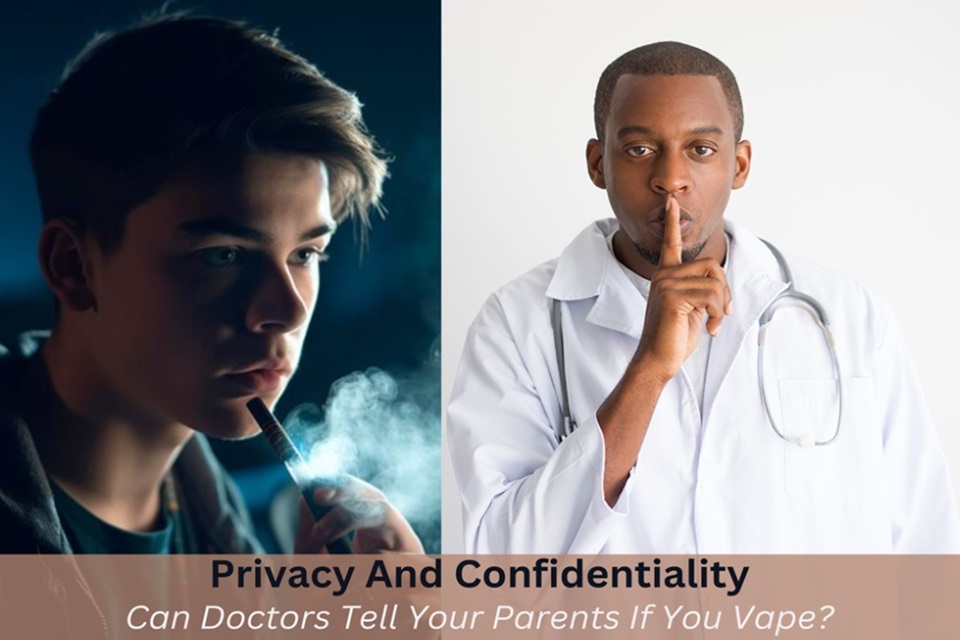
Vaping has become increasingly popular, especially among teenagers. However, it raises significant health concerns and questions about privacy and confidentiality, particularly for minors. This article explores whether doctors can tell your parents if you vape, the rules and regulations surrounding doctor-patient confidentiality, and the best ways to handle such situations.
What Is Vaping?
Vaping includes breathing in vapor generated by an electronic cigarette or a similar gadget. These gadgets heat a liquid that contains nicotine, flavorings, and other substances to produce the vapor. In contrast to regular cigarettes, vaping does not involve burning tobacco, which decreases the amount of harmful chemicals inhaled. Nonetheless, vaping still presents health hazards, such as nicotine dependence, lung impairment, heart disease, and oral health issues.
Potential Concerns Of Vaping
- Addiction: Nicotine in vaping liquids is highly addictive.
- Lung Damage: Vaping can cause chronic bronchitis and other lung issues.
- Heart Disease: Increases heart rate and blood pressure, potentially leading to heart disease and stroke.
- Oral Health: Nicotine can lead to gum disease and tooth decay.
Privacy & Confidentiality: Rules & Regulations
Doctor-Patient Confidentiality
Doctor-patient confidentiality is a fundamental principle in healthcare. It ensures that personal health information is not disclosed without the patient’s consent. This confidentiality is essential for building trust between doctors and patients and enabling open and honest communication about health issues.
Confidentiality If You Are A Minor
Confidentiality rules for minors can be more complex. Generally, doctors must maintain confidentiality for patients under 18 seeking specific medical services, such as reproductive health or mental health care. However, for general medical care, doctors might share information with parents, depending on state laws, the nature of the health issue, and the legal age of vaping around the world.
Exceptions
There are exceptions to confidentiality rules, including:
- Risk of Harm: If a doctor believes a patient is in danger of harming themselves or others, they may disclose information to someone who can help, such as a parent or guardian.
- Legal Requirements: Some states require doctors to report certain conditions or behaviors, such as infectious diseases or suspected abuse.
Can Doctors Tell Your Parents If You Vape?
Whether doctors can tell your parents about your vaping depends on several factors:
- Age and State Laws: If you are a minor, state laws may allow doctors to disclose certain health information to your parents.
- Health Risks: If your vaping has led to significant health issues, a doctor might need to inform your parents to ensure proper care.
- Type of Medical Care: For specific services like mental health, confidentiality is typically stricter, and doctors may not disclose information without your consent.
Best Way To Handle
If you vape and are concerned about your parents finding out, consider the following steps:
- Be Honest with Your Doctor: Transparency helps ensure you receive the best possible care.
- Understand Your Rights: Familiarize yourself with confidentiality laws in your state.
- Discuss Concerns: Talk to your doctor about your privacy concerns and seek their advice on handling conversations with your parents.
- Plan the Conversation: If you decide to tell your parents, plan what you will say and consider involving your doctor for support.
Final Words
Understanding the implications of vaping on your health and privacy is crucial. While doctor-patient confidentiality generally protects your information, there are circumstances where your doctor might need to disclose your vaping habits to your parents. Open communication with your doctor can help you navigate these situations effectively.
FAQs
Can doctors detect if you vape from a blood test?
Yes, doctors can detect nicotine and its metabolites, such as cotinine, in your blood, which indicates vaping.
Will my dentist know if I vape?
Dentists may suspect vaping if they notice signs like dry mouth, gum disease, or cavities during an examination.
Are there legal obligations for doctors to report vaping?
In some states, doctors may need to report health issues related to vaping, especially if it poses significant health risks.
Can I keep my vaping habits confidential from my parents?
It depends on your age, state laws, and the nature of your medical care. Discuss confidentiality concerns with your doctor to understand your rights.





